Fundamental of Mental Health Nursing: Principles of Recovery and Therapeutic Alliance
VerifiedAdded on 2023/06/07
|9
|2348
|473
AI Summary
This article discusses the principles of recovery and therapeutic alliance in mental health nursing. It covers the three classes of descriptions of recovery, the importance of social interventions, and the three positive-based aspects of recovery. It also explains the concept of therapeutic alliance and how it is developed in a mental health recovery model.
Contribute Materials
Your contribution can guide someone’s learning journey. Share your
documents today.
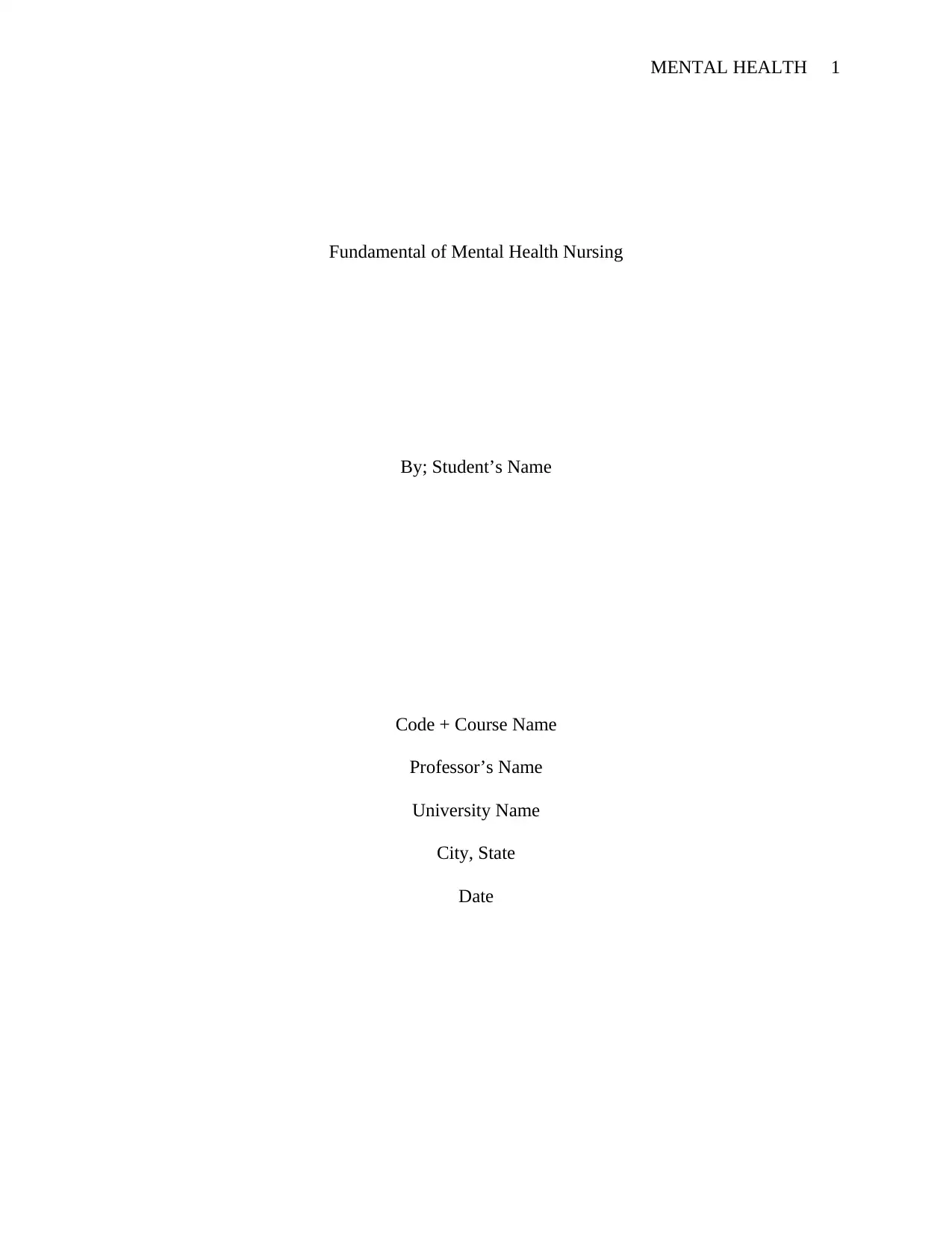
MENTAL HEALTH 1
Fundamental of Mental Health Nursing
By; Student’s Name
Code + Course Name
Professor’s Name
University Name
City, State
Date
Fundamental of Mental Health Nursing
By; Student’s Name
Code + Course Name
Professor’s Name
University Name
City, State
Date
Secure Best Marks with AI Grader
Need help grading? Try our AI Grader for instant feedback on your assignments.
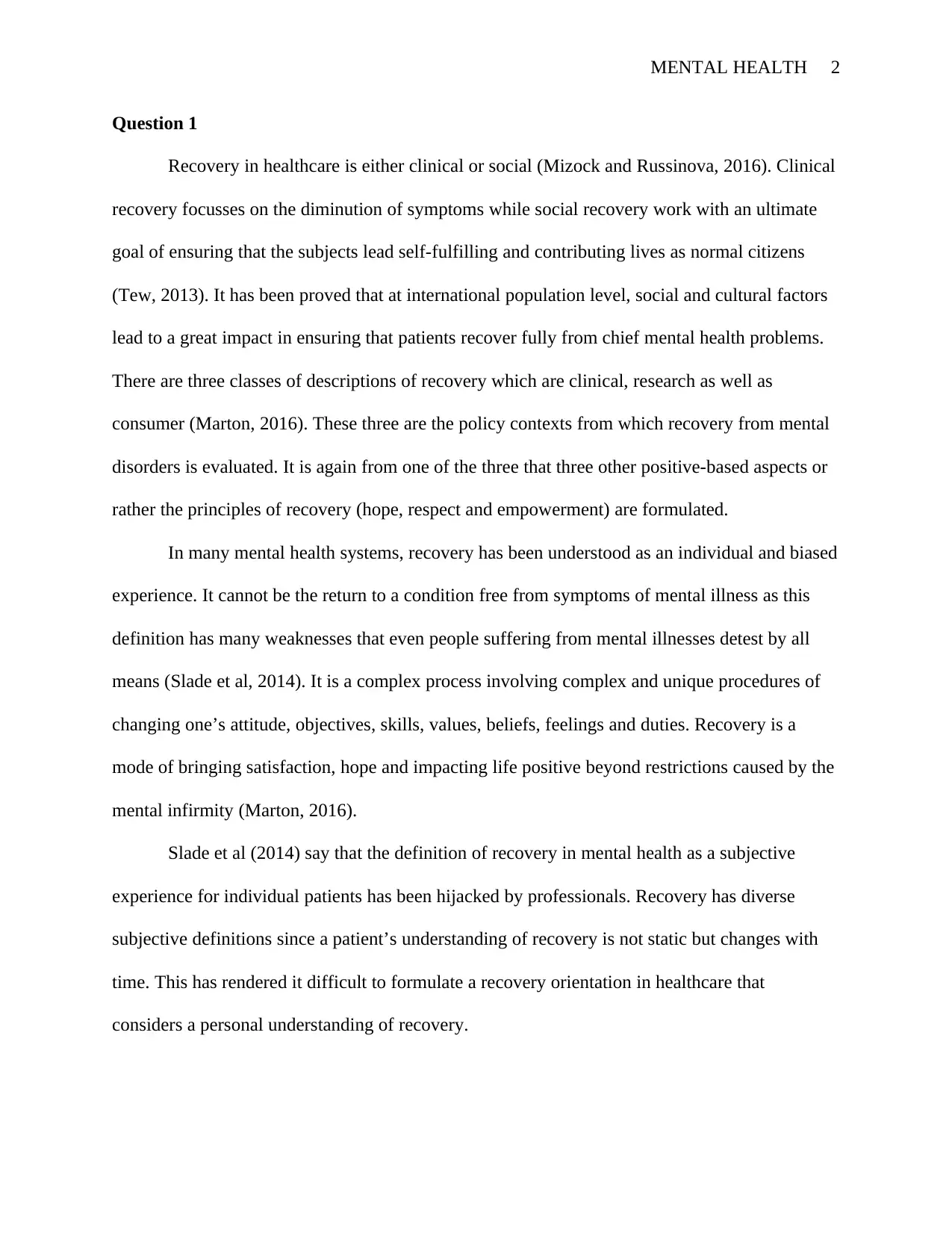
MENTAL HEALTH 2
Question 1
Recovery in healthcare is either clinical or social (Mizock and Russinova, 2016). Clinical
recovery focusses on the diminution of symptoms while social recovery work with an ultimate
goal of ensuring that the subjects lead self-fulfilling and contributing lives as normal citizens
(Tew, 2013). It has been proved that at international population level, social and cultural factors
lead to a great impact in ensuring that patients recover fully from chief mental health problems.
There are three classes of descriptions of recovery which are clinical, research as well as
consumer (Marton, 2016). These three are the policy contexts from which recovery from mental
disorders is evaluated. It is again from one of the three that three other positive-based aspects or
rather the principles of recovery (hope, respect and empowerment) are formulated.
In many mental health systems, recovery has been understood as an individual and biased
experience. It cannot be the return to a condition free from symptoms of mental illness as this
definition has many weaknesses that even people suffering from mental illnesses detest by all
means (Slade et al, 2014). It is a complex process involving complex and unique procedures of
changing one’s attitude, objectives, skills, values, beliefs, feelings and duties. Recovery is a
mode of bringing satisfaction, hope and impacting life positive beyond restrictions caused by the
mental infirmity (Marton, 2016).
Slade et al (2014) say that the definition of recovery in mental health as a subjective
experience for individual patients has been hijacked by professionals. Recovery has diverse
subjective definitions since a patient’s understanding of recovery is not static but changes with
time. This has rendered it difficult to formulate a recovery orientation in healthcare that
considers a personal understanding of recovery.
Question 1
Recovery in healthcare is either clinical or social (Mizock and Russinova, 2016). Clinical
recovery focusses on the diminution of symptoms while social recovery work with an ultimate
goal of ensuring that the subjects lead self-fulfilling and contributing lives as normal citizens
(Tew, 2013). It has been proved that at international population level, social and cultural factors
lead to a great impact in ensuring that patients recover fully from chief mental health problems.
There are three classes of descriptions of recovery which are clinical, research as well as
consumer (Marton, 2016). These three are the policy contexts from which recovery from mental
disorders is evaluated. It is again from one of the three that three other positive-based aspects or
rather the principles of recovery (hope, respect and empowerment) are formulated.
In many mental health systems, recovery has been understood as an individual and biased
experience. It cannot be the return to a condition free from symptoms of mental illness as this
definition has many weaknesses that even people suffering from mental illnesses detest by all
means (Slade et al, 2014). It is a complex process involving complex and unique procedures of
changing one’s attitude, objectives, skills, values, beliefs, feelings and duties. Recovery is a
mode of bringing satisfaction, hope and impacting life positive beyond restrictions caused by the
mental infirmity (Marton, 2016).
Slade et al (2014) say that the definition of recovery in mental health as a subjective
experience for individual patients has been hijacked by professionals. Recovery has diverse
subjective definitions since a patient’s understanding of recovery is not static but changes with
time. This has rendered it difficult to formulate a recovery orientation in healthcare that
considers a personal understanding of recovery.
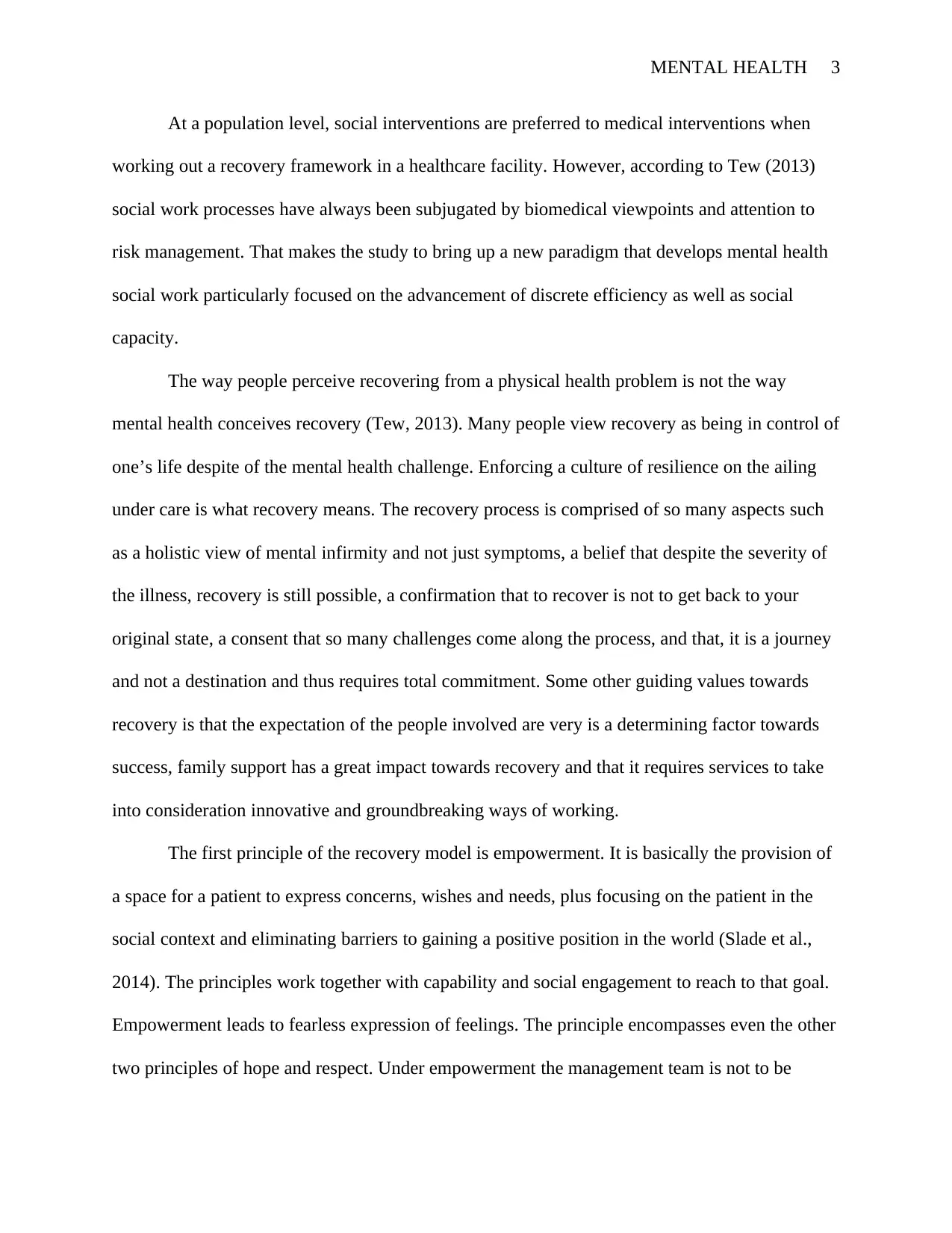
MENTAL HEALTH 3
At a population level, social interventions are preferred to medical interventions when
working out a recovery framework in a healthcare facility. However, according to Tew (2013)
social work processes have always been subjugated by biomedical viewpoints and attention to
risk management. That makes the study to bring up a new paradigm that develops mental health
social work particularly focused on the advancement of discrete efficiency as well as social
capacity.
The way people perceive recovering from a physical health problem is not the way
mental health conceives recovery (Tew, 2013). Many people view recovery as being in control of
one’s life despite of the mental health challenge. Enforcing a culture of resilience on the ailing
under care is what recovery means. The recovery process is comprised of so many aspects such
as a holistic view of mental infirmity and not just symptoms, a belief that despite the severity of
the illness, recovery is still possible, a confirmation that to recover is not to get back to your
original state, a consent that so many challenges come along the process, and that, it is a journey
and not a destination and thus requires total commitment. Some other guiding values towards
recovery is that the expectation of the people involved are very is a determining factor towards
success, family support has a great impact towards recovery and that it requires services to take
into consideration innovative and groundbreaking ways of working.
The first principle of the recovery model is empowerment. It is basically the provision of
a space for a patient to express concerns, wishes and needs, plus focusing on the patient in the
social context and eliminating barriers to gaining a positive position in the world (Slade et al.,
2014). The principles work together with capability and social engagement to reach to that goal.
Empowerment leads to fearless expression of feelings. The principle encompasses even the other
two principles of hope and respect. Under empowerment the management team is not to be
At a population level, social interventions are preferred to medical interventions when
working out a recovery framework in a healthcare facility. However, according to Tew (2013)
social work processes have always been subjugated by biomedical viewpoints and attention to
risk management. That makes the study to bring up a new paradigm that develops mental health
social work particularly focused on the advancement of discrete efficiency as well as social
capacity.
The way people perceive recovering from a physical health problem is not the way
mental health conceives recovery (Tew, 2013). Many people view recovery as being in control of
one’s life despite of the mental health challenge. Enforcing a culture of resilience on the ailing
under care is what recovery means. The recovery process is comprised of so many aspects such
as a holistic view of mental infirmity and not just symptoms, a belief that despite the severity of
the illness, recovery is still possible, a confirmation that to recover is not to get back to your
original state, a consent that so many challenges come along the process, and that, it is a journey
and not a destination and thus requires total commitment. Some other guiding values towards
recovery is that the expectation of the people involved are very is a determining factor towards
success, family support has a great impact towards recovery and that it requires services to take
into consideration innovative and groundbreaking ways of working.
The first principle of the recovery model is empowerment. It is basically the provision of
a space for a patient to express concerns, wishes and needs, plus focusing on the patient in the
social context and eliminating barriers to gaining a positive position in the world (Slade et al.,
2014). The principles work together with capability and social engagement to reach to that goal.
Empowerment leads to fearless expression of feelings. The principle encompasses even the other
two principles of hope and respect. Under empowerment the management team is not to be
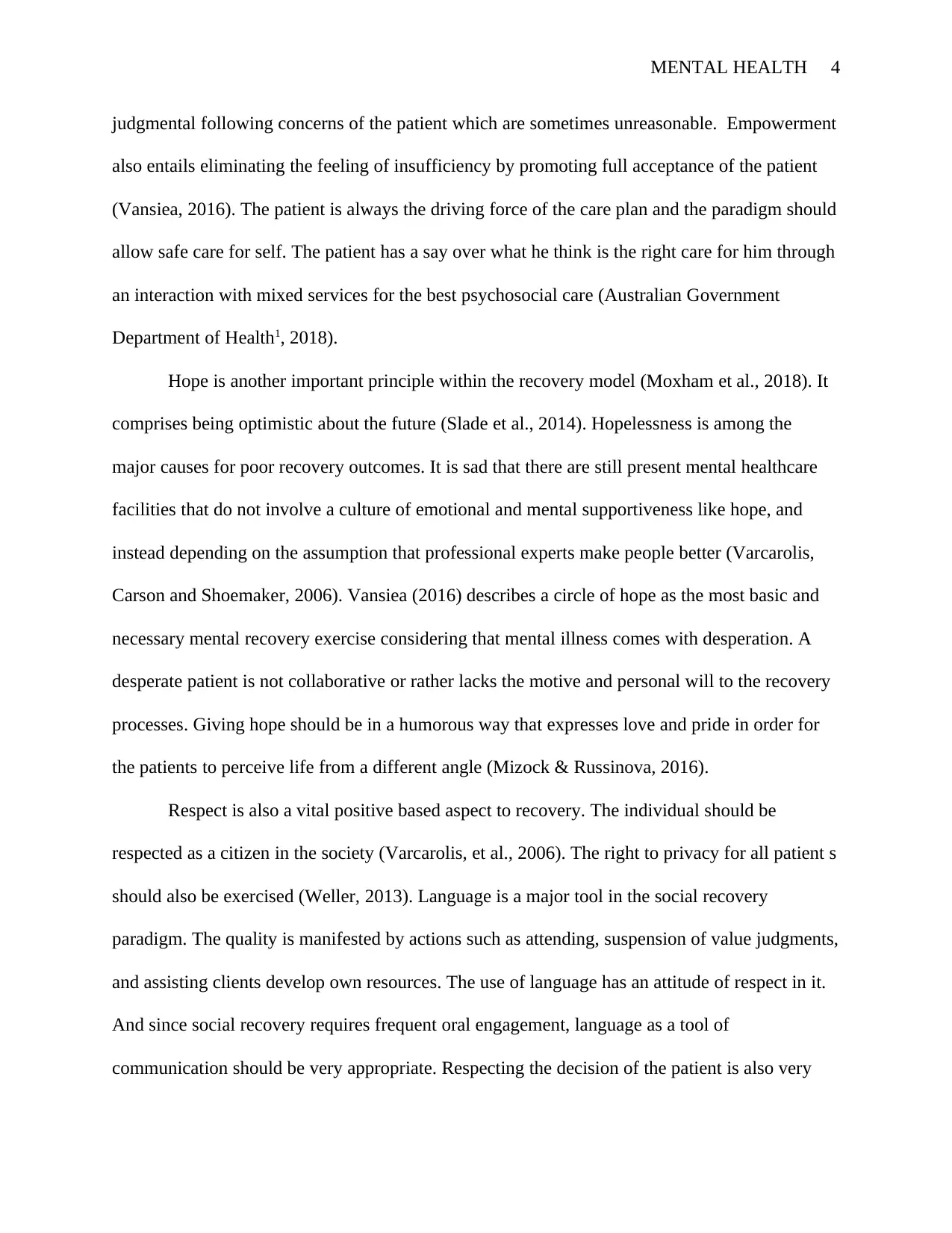
MENTAL HEALTH 4
judgmental following concerns of the patient which are sometimes unreasonable. Empowerment
also entails eliminating the feeling of insufficiency by promoting full acceptance of the patient
(Vansiea, 2016). The patient is always the driving force of the care plan and the paradigm should
allow safe care for self. The patient has a say over what he think is the right care for him through
an interaction with mixed services for the best psychosocial care (Australian Government
Department of Health1, 2018).
Hope is another important principle within the recovery model (Moxham et al., 2018). It
comprises being optimistic about the future (Slade et al., 2014). Hopelessness is among the
major causes for poor recovery outcomes. It is sad that there are still present mental healthcare
facilities that do not involve a culture of emotional and mental supportiveness like hope, and
instead depending on the assumption that professional experts make people better (Varcarolis,
Carson and Shoemaker, 2006). Vansiea (2016) describes a circle of hope as the most basic and
necessary mental recovery exercise considering that mental illness comes with desperation. A
desperate patient is not collaborative or rather lacks the motive and personal will to the recovery
processes. Giving hope should be in a humorous way that expresses love and pride in order for
the patients to perceive life from a different angle (Mizock & Russinova, 2016).
Respect is also a vital positive based aspect to recovery. The individual should be
respected as a citizen in the society (Varcarolis, et al., 2006). The right to privacy for all patient s
should also be exercised (Weller, 2013). Language is a major tool in the social recovery
paradigm. The quality is manifested by actions such as attending, suspension of value judgments,
and assisting clients develop own resources. The use of language has an attitude of respect in it.
And since social recovery requires frequent oral engagement, language as a tool of
communication should be very appropriate. Respecting the decision of the patient is also very
judgmental following concerns of the patient which are sometimes unreasonable. Empowerment
also entails eliminating the feeling of insufficiency by promoting full acceptance of the patient
(Vansiea, 2016). The patient is always the driving force of the care plan and the paradigm should
allow safe care for self. The patient has a say over what he think is the right care for him through
an interaction with mixed services for the best psychosocial care (Australian Government
Department of Health1, 2018).
Hope is another important principle within the recovery model (Moxham et al., 2018). It
comprises being optimistic about the future (Slade et al., 2014). Hopelessness is among the
major causes for poor recovery outcomes. It is sad that there are still present mental healthcare
facilities that do not involve a culture of emotional and mental supportiveness like hope, and
instead depending on the assumption that professional experts make people better (Varcarolis,
Carson and Shoemaker, 2006). Vansiea (2016) describes a circle of hope as the most basic and
necessary mental recovery exercise considering that mental illness comes with desperation. A
desperate patient is not collaborative or rather lacks the motive and personal will to the recovery
processes. Giving hope should be in a humorous way that expresses love and pride in order for
the patients to perceive life from a different angle (Mizock & Russinova, 2016).
Respect is also a vital positive based aspect to recovery. The individual should be
respected as a citizen in the society (Varcarolis, et al., 2006). The right to privacy for all patient s
should also be exercised (Weller, 2013). Language is a major tool in the social recovery
paradigm. The quality is manifested by actions such as attending, suspension of value judgments,
and assisting clients develop own resources. The use of language has an attitude of respect in it.
And since social recovery requires frequent oral engagement, language as a tool of
communication should be very appropriate. Respecting the decision of the patient is also very
Secure Best Marks with AI Grader
Need help grading? Try our AI Grader for instant feedback on your assignments.
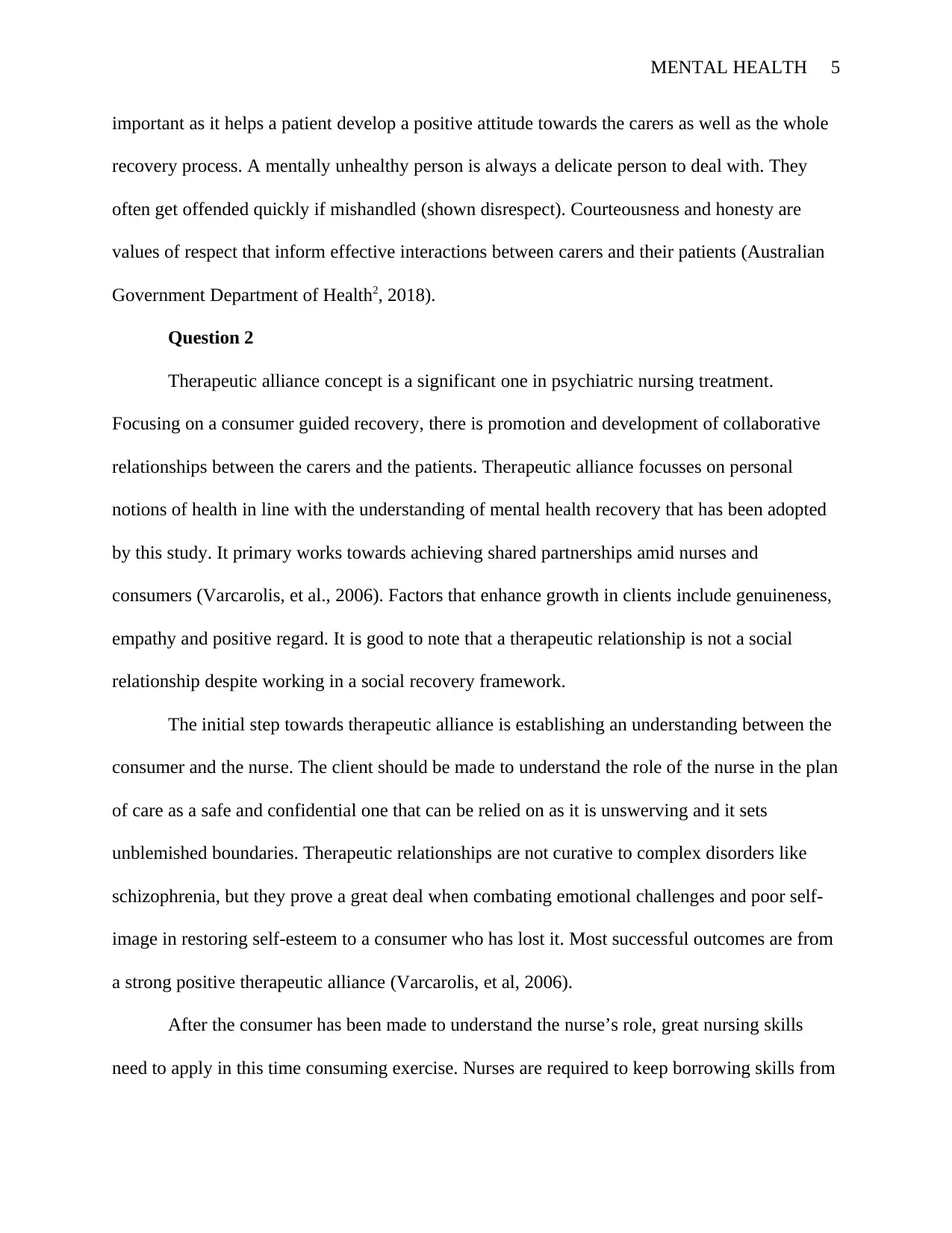
MENTAL HEALTH 5
important as it helps a patient develop a positive attitude towards the carers as well as the whole
recovery process. A mentally unhealthy person is always a delicate person to deal with. They
often get offended quickly if mishandled (shown disrespect). Courteousness and honesty are
values of respect that inform effective interactions between carers and their patients (Australian
Government Department of Health2, 2018).
Question 2
Therapeutic alliance concept is a significant one in psychiatric nursing treatment.
Focusing on a consumer guided recovery, there is promotion and development of collaborative
relationships between the carers and the patients. Therapeutic alliance focusses on personal
notions of health in line with the understanding of mental health recovery that has been adopted
by this study. It primary works towards achieving shared partnerships amid nurses and
consumers (Varcarolis, et al., 2006). Factors that enhance growth in clients include genuineness,
empathy and positive regard. It is good to note that a therapeutic relationship is not a social
relationship despite working in a social recovery framework.
The initial step towards therapeutic alliance is establishing an understanding between the
consumer and the nurse. The client should be made to understand the role of the nurse in the plan
of care as a safe and confidential one that can be relied on as it is unswerving and it sets
unblemished boundaries. Therapeutic relationships are not curative to complex disorders like
schizophrenia, but they prove a great deal when combating emotional challenges and poor self-
image in restoring self-esteem to a consumer who has lost it. Most successful outcomes are from
a strong positive therapeutic alliance (Varcarolis, et al, 2006).
After the consumer has been made to understand the nurse’s role, great nursing skills
need to apply in this time consuming exercise. Nurses are required to keep borrowing skills from
important as it helps a patient develop a positive attitude towards the carers as well as the whole
recovery process. A mentally unhealthy person is always a delicate person to deal with. They
often get offended quickly if mishandled (shown disrespect). Courteousness and honesty are
values of respect that inform effective interactions between carers and their patients (Australian
Government Department of Health2, 2018).
Question 2
Therapeutic alliance concept is a significant one in psychiatric nursing treatment.
Focusing on a consumer guided recovery, there is promotion and development of collaborative
relationships between the carers and the patients. Therapeutic alliance focusses on personal
notions of health in line with the understanding of mental health recovery that has been adopted
by this study. It primary works towards achieving shared partnerships amid nurses and
consumers (Varcarolis, et al., 2006). Factors that enhance growth in clients include genuineness,
empathy and positive regard. It is good to note that a therapeutic relationship is not a social
relationship despite working in a social recovery framework.
The initial step towards therapeutic alliance is establishing an understanding between the
consumer and the nurse. The client should be made to understand the role of the nurse in the plan
of care as a safe and confidential one that can be relied on as it is unswerving and it sets
unblemished boundaries. Therapeutic relationships are not curative to complex disorders like
schizophrenia, but they prove a great deal when combating emotional challenges and poor self-
image in restoring self-esteem to a consumer who has lost it. Most successful outcomes are from
a strong positive therapeutic alliance (Varcarolis, et al, 2006).
After the consumer has been made to understand the nurse’s role, great nursing skills
need to apply in this time consuming exercise. Nurses are required to keep borrowing skills from
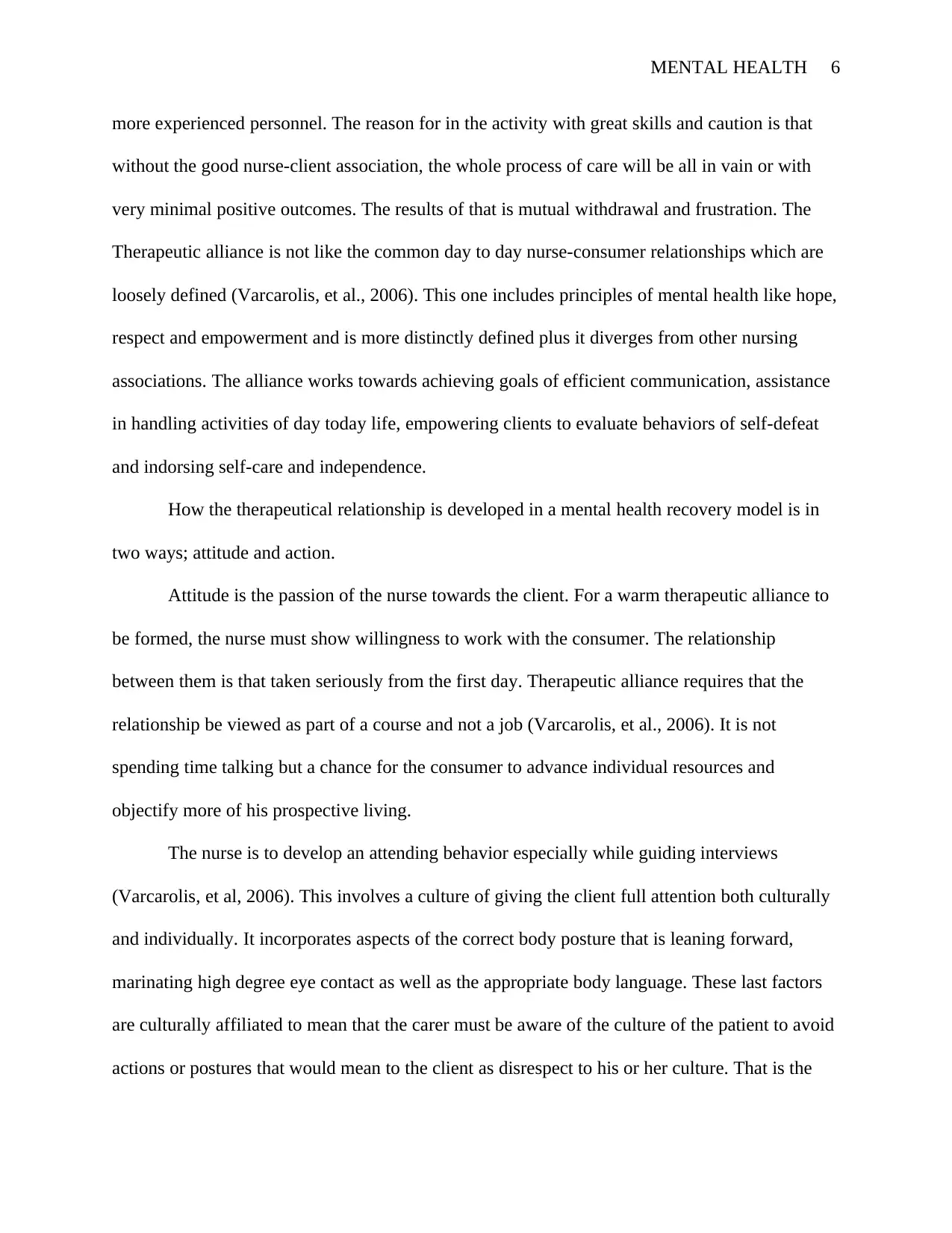
MENTAL HEALTH 6
more experienced personnel. The reason for in the activity with great skills and caution is that
without the good nurse-client association, the whole process of care will be all in vain or with
very minimal positive outcomes. The results of that is mutual withdrawal and frustration. The
Therapeutic alliance is not like the common day to day nurse-consumer relationships which are
loosely defined (Varcarolis, et al., 2006). This one includes principles of mental health like hope,
respect and empowerment and is more distinctly defined plus it diverges from other nursing
associations. The alliance works towards achieving goals of efficient communication, assistance
in handling activities of day today life, empowering clients to evaluate behaviors of self-defeat
and indorsing self-care and independence.
How the therapeutical relationship is developed in a mental health recovery model is in
two ways; attitude and action.
Attitude is the passion of the nurse towards the client. For a warm therapeutic alliance to
be formed, the nurse must show willingness to work with the consumer. The relationship
between them is that taken seriously from the first day. Therapeutic alliance requires that the
relationship be viewed as part of a course and not a job (Varcarolis, et al., 2006). It is not
spending time talking but a chance for the consumer to advance individual resources and
objectify more of his prospective living.
The nurse is to develop an attending behavior especially while guiding interviews
(Varcarolis, et al, 2006). This involves a culture of giving the client full attention both culturally
and individually. It incorporates aspects of the correct body posture that is leaning forward,
marinating high degree eye contact as well as the appropriate body language. These last factors
are culturally affiliated to mean that the carer must be aware of the culture of the patient to avoid
actions or postures that would mean to the client as disrespect to his or her culture. That is the
more experienced personnel. The reason for in the activity with great skills and caution is that
without the good nurse-client association, the whole process of care will be all in vain or with
very minimal positive outcomes. The results of that is mutual withdrawal and frustration. The
Therapeutic alliance is not like the common day to day nurse-consumer relationships which are
loosely defined (Varcarolis, et al., 2006). This one includes principles of mental health like hope,
respect and empowerment and is more distinctly defined plus it diverges from other nursing
associations. The alliance works towards achieving goals of efficient communication, assistance
in handling activities of day today life, empowering clients to evaluate behaviors of self-defeat
and indorsing self-care and independence.
How the therapeutical relationship is developed in a mental health recovery model is in
two ways; attitude and action.
Attitude is the passion of the nurse towards the client. For a warm therapeutic alliance to
be formed, the nurse must show willingness to work with the consumer. The relationship
between them is that taken seriously from the first day. Therapeutic alliance requires that the
relationship be viewed as part of a course and not a job (Varcarolis, et al., 2006). It is not
spending time talking but a chance for the consumer to advance individual resources and
objectify more of his prospective living.
The nurse is to develop an attending behavior especially while guiding interviews
(Varcarolis, et al, 2006). This involves a culture of giving the client full attention both culturally
and individually. It incorporates aspects of the correct body posture that is leaning forward,
marinating high degree eye contact as well as the appropriate body language. These last factors
are culturally affiliated to mean that the carer must be aware of the culture of the patient to avoid
actions or postures that would mean to the client as disrespect to his or her culture. That is the
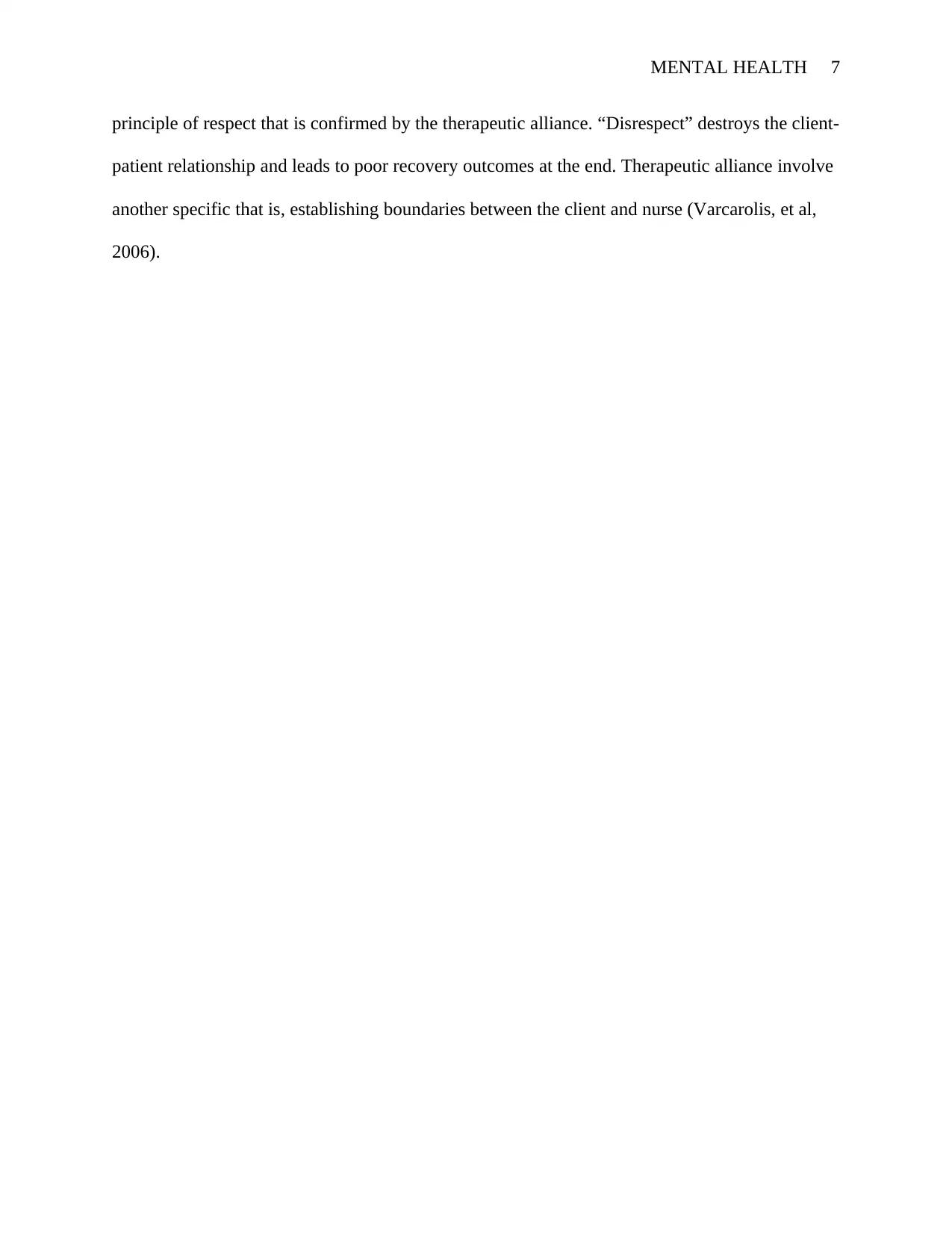
MENTAL HEALTH 7
principle of respect that is confirmed by the therapeutic alliance. “Disrespect” destroys the client-
patient relationship and leads to poor recovery outcomes at the end. Therapeutic alliance involve
another specific that is, establishing boundaries between the client and nurse (Varcarolis, et al,
2006).
principle of respect that is confirmed by the therapeutic alliance. “Disrespect” destroys the client-
patient relationship and leads to poor recovery outcomes at the end. Therapeutic alliance involve
another specific that is, establishing boundaries between the client and nurse (Varcarolis, et al,
2006).
Paraphrase This Document
Need a fresh take? Get an instant paraphrase of this document with our AI Paraphraser
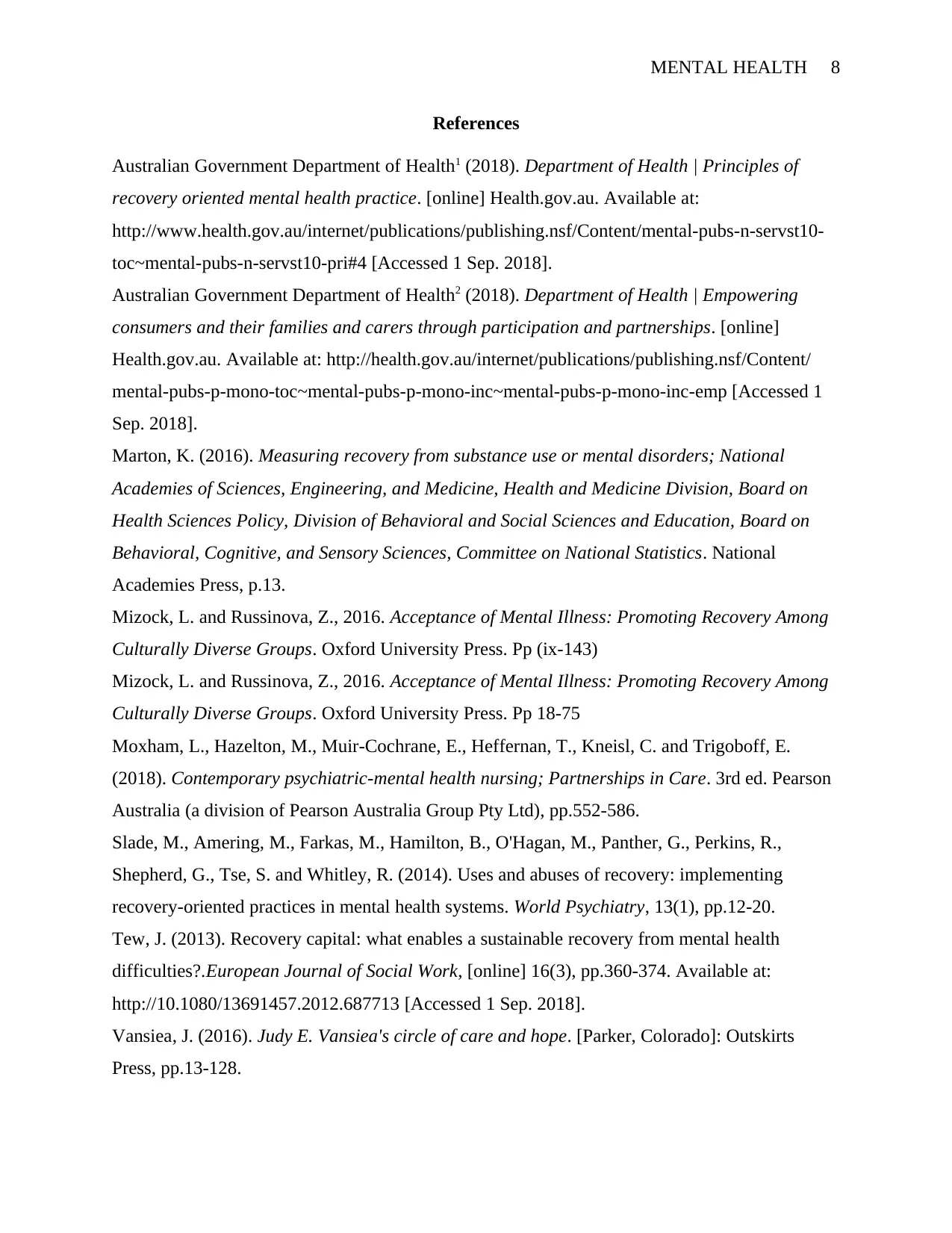
MENTAL HEALTH 8
References
Australian Government Department of Health1 (2018). Department of Health | Principles of
recovery oriented mental health practice. [online] Health.gov.au. Available at:
http://www.health.gov.au/internet/publications/publishing.nsf/Content/mental-pubs-n-servst10-
toc~mental-pubs-n-servst10-pri#4 [Accessed 1 Sep. 2018].
Australian Government Department of Health2 (2018). Department of Health | Empowering
consumers and their families and carers through participation and partnerships. [online]
Health.gov.au. Available at: http://health.gov.au/internet/publications/publishing.nsf/Content/
mental-pubs-p-mono-toc~mental-pubs-p-mono-inc~mental-pubs-p-mono-inc-emp [Accessed 1
Sep. 2018].
Marton, K. (2016). Measuring recovery from substance use or mental disorders; National
Academies of Sciences, Engineering, and Medicine, Health and Medicine Division, Board on
Health Sciences Policy, Division of Behavioral and Social Sciences and Education, Board on
Behavioral, Cognitive, and Sensory Sciences, Committee on National Statistics. National
Academies Press, p.13.
Mizock, L. and Russinova, Z., 2016. Acceptance of Mental Illness: Promoting Recovery Among
Culturally Diverse Groups. Oxford University Press. Pp (ix-143)
Mizock, L. and Russinova, Z., 2016. Acceptance of Mental Illness: Promoting Recovery Among
Culturally Diverse Groups. Oxford University Press. Pp 18-75
Moxham, L., Hazelton, M., Muir-Cochrane, E., Heffernan, T., Kneisl, C. and Trigoboff, E.
(2018). Contemporary psychiatric-mental health nursing; Partnerships in Care. 3rd ed. Pearson
Australia (a division of Pearson Australia Group Pty Ltd), pp.552-586.
Slade, M., Amering, M., Farkas, M., Hamilton, B., O'Hagan, M., Panther, G., Perkins, R.,
Shepherd, G., Tse, S. and Whitley, R. (2014). Uses and abuses of recovery: implementing
recovery-oriented practices in mental health systems. World Psychiatry, 13(1), pp.12-20.
Tew, J. (2013). Recovery capital: what enables a sustainable recovery from mental health
difficulties?.European Journal of Social Work, [online] 16(3), pp.360-374. Available at:
http://10.1080/13691457.2012.687713 [Accessed 1 Sep. 2018].
Vansiea, J. (2016). Judy E. Vansiea's circle of care and hope. [Parker, Colorado]: Outskirts
Press, pp.13-128.
References
Australian Government Department of Health1 (2018). Department of Health | Principles of
recovery oriented mental health practice. [online] Health.gov.au. Available at:
http://www.health.gov.au/internet/publications/publishing.nsf/Content/mental-pubs-n-servst10-
toc~mental-pubs-n-servst10-pri#4 [Accessed 1 Sep. 2018].
Australian Government Department of Health2 (2018). Department of Health | Empowering
consumers and their families and carers through participation and partnerships. [online]
Health.gov.au. Available at: http://health.gov.au/internet/publications/publishing.nsf/Content/
mental-pubs-p-mono-toc~mental-pubs-p-mono-inc~mental-pubs-p-mono-inc-emp [Accessed 1
Sep. 2018].
Marton, K. (2016). Measuring recovery from substance use or mental disorders; National
Academies of Sciences, Engineering, and Medicine, Health and Medicine Division, Board on
Health Sciences Policy, Division of Behavioral and Social Sciences and Education, Board on
Behavioral, Cognitive, and Sensory Sciences, Committee on National Statistics. National
Academies Press, p.13.
Mizock, L. and Russinova, Z., 2016. Acceptance of Mental Illness: Promoting Recovery Among
Culturally Diverse Groups. Oxford University Press. Pp (ix-143)
Mizock, L. and Russinova, Z., 2016. Acceptance of Mental Illness: Promoting Recovery Among
Culturally Diverse Groups. Oxford University Press. Pp 18-75
Moxham, L., Hazelton, M., Muir-Cochrane, E., Heffernan, T., Kneisl, C. and Trigoboff, E.
(2018). Contemporary psychiatric-mental health nursing; Partnerships in Care. 3rd ed. Pearson
Australia (a division of Pearson Australia Group Pty Ltd), pp.552-586.
Slade, M., Amering, M., Farkas, M., Hamilton, B., O'Hagan, M., Panther, G., Perkins, R.,
Shepherd, G., Tse, S. and Whitley, R. (2014). Uses and abuses of recovery: implementing
recovery-oriented practices in mental health systems. World Psychiatry, 13(1), pp.12-20.
Tew, J. (2013). Recovery capital: what enables a sustainable recovery from mental health
difficulties?.European Journal of Social Work, [online] 16(3), pp.360-374. Available at:
http://10.1080/13691457.2012.687713 [Accessed 1 Sep. 2018].
Vansiea, J. (2016). Judy E. Vansiea's circle of care and hope. [Parker, Colorado]: Outskirts
Press, pp.13-128.
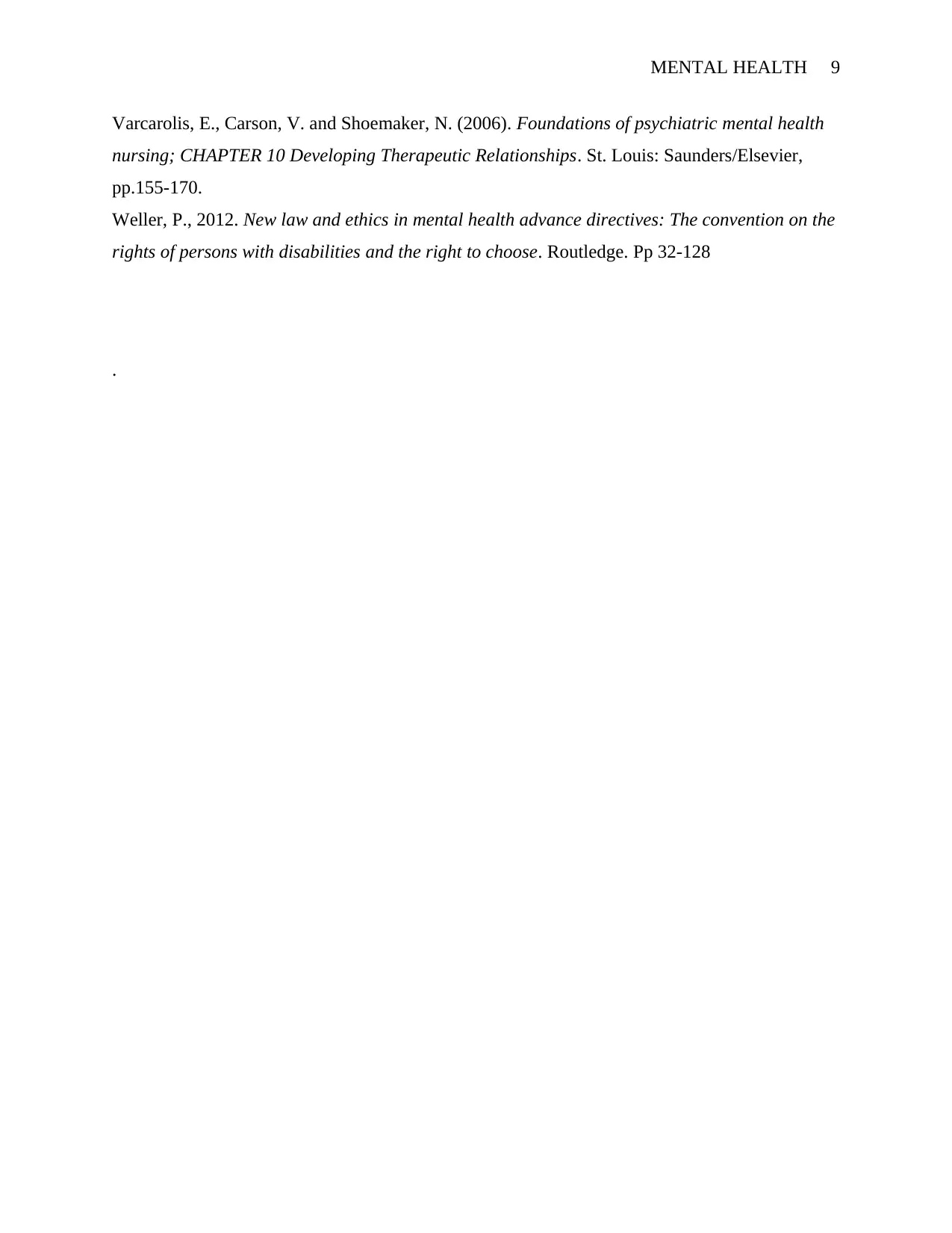
MENTAL HEALTH 9
Varcarolis, E., Carson, V. and Shoemaker, N. (2006). Foundations of psychiatric mental health
nursing; CHAPTER 10 Developing Therapeutic Relationships. St. Louis: Saunders/Elsevier,
pp.155-170.
Weller, P., 2012. New law and ethics in mental health advance directives: The convention on the
rights of persons with disabilities and the right to choose. Routledge. Pp 32-128
.
Varcarolis, E., Carson, V. and Shoemaker, N. (2006). Foundations of psychiatric mental health
nursing; CHAPTER 10 Developing Therapeutic Relationships. St. Louis: Saunders/Elsevier,
pp.155-170.
Weller, P., 2012. New law and ethics in mental health advance directives: The convention on the
rights of persons with disabilities and the right to choose. Routledge. Pp 32-128
.
1 out of 9
Related Documents
Your All-in-One AI-Powered Toolkit for Academic Success.
+13062052269
info@desklib.com
Available 24*7 on WhatsApp / Email
![[object Object]](/_next/static/media/star-bottom.7253800d.svg)
Unlock your academic potential
© 2024 | Zucol Services PVT LTD | All rights reserved.




